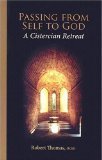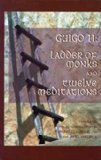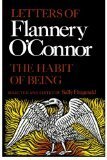Carl McColman's Blog, page 80
March 27, 2012
Two New Books on Prayer

The Province of Joy
I see in [Flannery] O'Connor an example of a person who has integrated her faith and her art so thoroughly that they have become one practice. In an era wherein such integration is not only rare but is considered by many people in both the sacred and secular realms to be anathema, O'Connor demonstrates that this can be done and done beautifully. Her own art becomes sign and symbol of the creative force that generates and governs the world, and so her writing becomes, both...
March 26, 2012
In Reality You Are Precious

Passing from Self to God
To yourself you seem of little worth, but in reality you are precious. Insofar as you forsook him whose image you are, you have taken on the colors of strange images. But when you begin to breathe in the atmosphere wherein you were created, if perchance you embrace discipline, you will quickly shake off and renounce this false make-up which is only superficial and not even skin-deep. Be wholly present to yourself, therefore, and employ yourself wholly in knowing...
March 23, 2012
Guigo II's Definition of Contemplation

Ladder of Monks and Twelve Meditations
Contemplation is when the mind is in some sort lifted up to God and held above itself, so that it tastes the joys of everlasting sweetness.
— Guigo II, The Ladder of Monks
The most commonly taught method of lectio divina — involving reading the Bible or some other sacred text, reflecting on the text, responding to it in prayer, and then resting in God's presence in contemplative silence — comes from a short essay called "the Ladder of Monks" written in the ...
March 22, 2012
Contemplation and the Mind of Christ

6th Century icon of Christ, from St. Catherine's Monastery, Mount Sinai
Some folks — especially those who are familiar with my interfaith work, or my books from before 2005 about neopagan and non-Christian Celtic spirituality — might wonder why I am so committed to the path of Christ. Couldn't I explore mysticism and meditation and contemplation in a non-sectarian or exclusively interspiritual way?
Well, yes, of course I could, and I hold no judgment for those who seek their spiritual maturity ...
March 21, 2012
Silence Is Not a Vow
Here is my latest column from Patheos. In it I look at the role of silence in the life of Christian monastics (monks and nuns) and then reflect on what that means for those of us who feel called to the contemplative life even though we do not live in a cloister. Hope you enjoy it…
Silence Is Not a Vow.
March 20, 2012
Mysticism for those who don't like "mysticism"
A reader writes:
[image error]In the first chapter of The Big Book of Christian Mysticism you offer your sense that mysticism offers the serious practitioner the possibility of experience of God that is transforming and which then enhances the world around us. I firmly agree. But does that mean such a transformative relationship is not open to those who can't accept the value of mysticism, or is it that the depth of the relationship is potentially greater through the pursuit of prayer, meditation and...
March 19, 2012
The Selfless Way of Christ

The Selfless Way of Christ
One way of defining the spiritual life is to see it as a life in which we keep making connections between God's story and our own.
— Henri Nouwen, The Selfless Way of Christ:
Downward Mobility and the Spiritual Life
In 1981, Henri Nouwen wrote a series of articles for Sojourners magazine, which were published in book form in 2007 as The Selfless Way of Christ, now newly available in a small paperback edition. Illustrated with a collection of drawings by Vincent Van...
March 17, 2012
By Your Words

Matthew 12:33-37
For my morning lectio divina, today I read Matthew 12:33-37. Although this passage is best known for "the tree is known by its fruit" (v. 33), two other parts of the passage particularly caught my attention this morning, from verses 34 and 37:
For out of the abundance of the heart the mouth speaks… for by your words you will be justified, and by your words you will be condemned.
Challenging words indeed for me as a writer — but also for anyone who loves to speak or write! What J...
March 16, 2012
Flannery O'Connor on Faith, Doubt, and Electric Blankets

Letters of Flannery O'Connor
I'm rather envious of my friend Mark; he works for Andalusia Farm, the home of the great Southern Gothic (and devoutly Catholic) author, Flannery O'Connor. Of course, I suppose Mark is envious of me working at the monastery, so that makes us even!
Anyway, today on his blog Mark posted a truly wonderful excerpt from one of Flannery's letters, in which she discusses faith, doubt and mystery. Here's a tidbit to whet your appetite:
A faith that just accepts is a child's...
March 15, 2012
Prayer and Prophecy

Prayer and Prophecy
Contemplation has a context: it does not occur in a vacuum. Today's context is that of the multinational corporations, the arms race, the strong state, the economic crisis, urban decay, the growing racism, and human loneliness. It is within this highly deranged culture that contemplatives explore the waste of their own being. It is in the midst of chaos and crisis that they pursue the vision of God and experience the conflict which is at the core of the contemplative...




